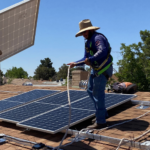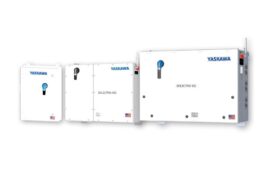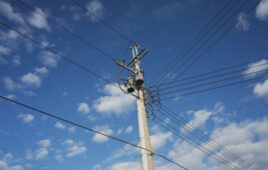U.S. Secretary of Energy Jennifer Granholm wrote an open letter to all U.S. mayors asking them to adopt SolarAPP+, a transformative online solar permitting tool that helps to speed rooftop solar deployment.
This effort comes as Secretary Granholm caps off the Summer of Solar, her push to educate Americans on the benefits of solar energy. Secretary Granholm set a goal to get 125 communities to sign up to learn more about SolarAPP+ by September 30.
“Until now, obtaining permits to install solar can take days, weeks or even months in some parts of the country, and can be a complex and costly process,” Secretary Granholm wrote. “At a time when we are using technology to create life-saving vaccines, connect with colleagues and family virtually, and explore outer space, it seems implausible we are still shuffling paper to process applications for solar permits.”
The software platform, developed by the National Renewable Energy Laboratory and several leading solar companies and organizations, automates the solar permitting process for local building departments. SolarAPP+ instantly analyzes whether a residential solar system is safely installed and complies with local building codes, helping to dramatically reduce the time it takes to get solar projects online.
“SolarAPP+ can reduce the solar permitting process from 8 weeks to just a few hours, making it a game-changer for large city governments and small towns alike,” said Abigail Ross Hopper, president and CEO of SEIA. “This online, no-cost tool makes it much easier and simpler to approve residential solar projects, saving local governments time and money. We need to do all we can to quickly deploy solar and meet our climate goals, and a tool like SolarAPP+ can help jumpstart our clean energy transformation.”
There are more than 15,000 local jurisdictions that approve solar permits, and each one has its own approach or system for approving these projects. SolarAPP+ helps to standardize the process while ensuring safety and can be universally adopted by state and local governments of all sizes. Because it is an online tool, SolarAPP+ helps municipalities cut down on staff hours and the resources needed to manually process applications, all while improving accuracy and reducing clerical errors, so staff can focus on more complex projects.
“We were the first to adopt SolarAPP+, and the first to issue a permit using it,” said Pleasant Hill Mayor Sue Noack. “We’ve just issued our 30th permit through SolarAPP+ and with all the building we’ve done, there have been no issues at all.”
SolarAPP+ is free for state and local governments to use and leads to a faster and more reliable experience for solar customers, solar installers, and building professionals. SolarAPP+ is currently available for residential solar installations and later expansions of the program will include battery storage as well as solar and solar + storage for commercial buildings.
News item from SEIA






“U.S. Secretary of Energy Jennifer Granholm wrote an open letter to all U.S. mayors asking them to adopt SolarAPP+, a transformative online solar permitting tool that helps to speed rooftop solar deployment.”
This is another “feel good” mandate without any teeth what-so-ever. Cities and Counties across the U.S. use their permitting process to fill in the funding gaps in local money income streams. Permit costs are just one low hanging fruit device to do this. In many places permitting fees are reasonable, in other jurisdictions they become concatenated and costly, pushing retail ratepayers away from adopting their own solar PV and energy storage systems for their homes. Granholm can ‘ask’, at some point all of the States of the Union that don’t want to ‘adopt’ the SolarAPP+ will have to be “told” Federal monies will be held back IF they don’t get on the train to smooth affordable energy technology programs.
” There are more than 15,000 local jurisdictions that approve solar permits, and each one has its own approach or system for approving these projects. SolarAPP+ helps to standardize the process while ensuring safety and can be universally adopted by state and local governments of all sizes.”
It’s the attractive dollar amount of setting up one’s own permitting process and costs that pushes a “national standard” off the table and towards oblivion as it kills one city, county “cash cow”, permitting fees and “plan reviews”.